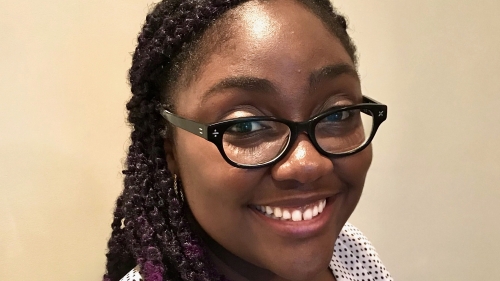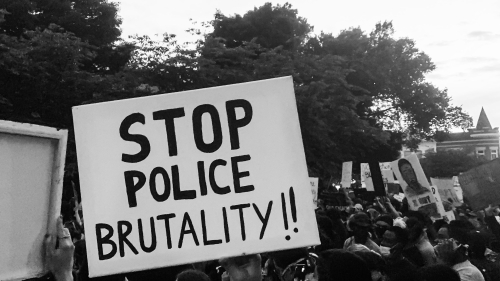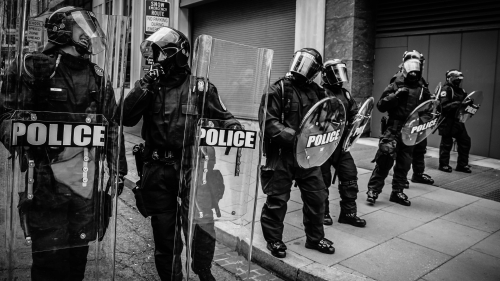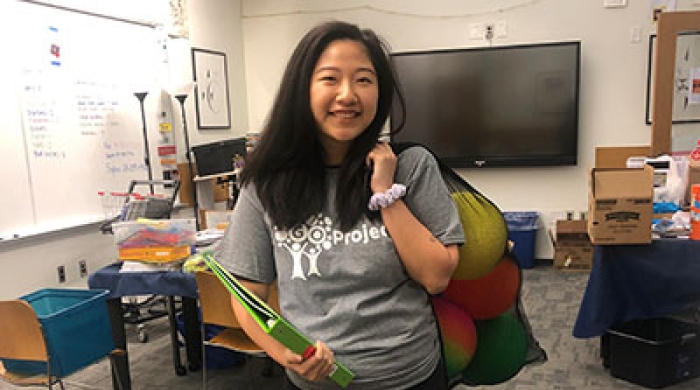Keisha April, assistant professor and faculty fellow in the Department of Applied Psychology, conducts research at intersection of psychology and criminal justice, examining factors that contribute to racial and ethnic disparities in the juvenile justice system. Specifically, her work seeks to promote greater understanding of the relationships between communities of color and the police. Her research has appeared in Advances in Psychology and Law, Behavioral Sciences and the Law, and the Cardozo Journal of Law and Gender, and has been supported by grants from the American Academy of Forensic Psychology and the Southern Regional Education Board.

How does your background as a lawyer influence your clinical work and your research interests? How do they work together?
My experience as a lawyer helps to strengthen my work as a clinician and researcher, just as I believe my work as a clinician has helped to strengthen my understanding -- and give me greater perspective -- as a legal practitioner. While working as a public defender, I realized that many of my clients’ offenses were related to biopsychosocial and environmental risk factors, and while programs or reduced pleas were available, those solutions often only acted as a temporary bandage because my clients would return a short time later to face harsher outcomes. During that time, I started to see the flaws in the criminal justice system and recognized that justice-involved individuals would face better outcomes if the system changed; I believed science was a key factor to inform those changes. I decided to return to research as a way to bridge this gap.
All of my experiences inform the way I construct my research questions, how I determine what populations to target with my research, and how I translate my research into recommendations for policy and practice changes."

My experience as a lawyer showed me that the system can often seem stacked against some individuals, whose life experiences and lack of access to resources makes it difficult for them to navigate the system effectively. Specifically, I was interested in understanding how we could divert individuals away from the justice system, and saw intervention at the juvenile stage to be one of the best opportunities to set individuals on a healthier trajectory. For example, research shows that keeping kids in school, providing them with interventions focused on social emotional learning, meeting kids’ basic needs (like food, shelter, safety), and identifying emotional and behavioral health needs may help target many of the issues that ultimately lead youth to become justice-involved. I was also interested in racial and ethnic disparities that take place at all stages of the justice process, from arrest to sentencing and placement, that result in harsher outcomes for individuals of color. I also became passionate about understanding the role that police play within communities, and while some communities may have negative relationships with the police, it seems that better understanding these relationships and finding strategies to improve them may help to change these experiences.
In my clinical training, I specialized in forensic psychology, where I worked to assess and develop recommendations for justice-involved individuals. I believe my training as a lawyer helped me better understand factors like false confessions, individuals’ lack of understanding of Miranda rights waivers and plea terms, and, frankly, how intimidating the court system can be, which all may lead to outcomes that may not be in a defendant’s best interest. I also worked with non justice-involved individuals in community mental health settings, which helped strengthen my understanding of how social systems in under-resourced communities struggle to meet the needs of individuals, and particularly children, with emotional and behavioral health needs. All of my experiences inform the way I construct my research questions, how I determine what populations to target with my research, and how I translate my research into recommendations for policy and practice changes.
I am especially passionate about engaging in research that helps bring to light patterns and practices that illustrate clear disparities and discriminatory practices."

Tell me about your current research.
My current research seeks to understand the relationships between police and communities of color. Relationships between police and communities are especially strained in communities of color, and, given the increasing national conversation on policing and police reform, I believe it is important to understand America’s relationship with the police from a diverse perspective. For many individuals, police are the first point of contact with the justice system, and better understanding police officers’ perspectives and the perspectives of the individuals they interact with may help to inform conversations about how to change negative interactions and outcomes. In past research, I have examined the belief systems of officers and looked at the role “color-blind” racial beliefs may play in how officers view White and Black youth. Currently, I am examining how youth develop their attitudes toward the police, and I am curious about whether parents play a role in “socializing” their children toward the police (legal socialization). I am focused on understanding whether parents of different races socialize their children differently toward the police and whether this may contribute to the relationships youth have with the police in their communities. This interest was inspired by my familiarity with a common practice within Black communities, known as “the talk,” in which parents prepare their children for navigating interactions with the police in an attempt to keep children safe. However, little research has examined whether this is unique to families/communities of color, or whether all parents engage in some form of socialization with their children about the police. I hope to continue to delve into this practice by understanding parents’ perspective and how youth use the messages parents communicate to inform their attitudes and beliefs about the police.

How can research and scholarship influence social and public policy? How can they be used to end discriminatory practices?
Research has a crucial role in changing social and public policies. Policy change is a long and often arduous process and I believe it is likely impossible to change policies without having data to support the hows and whys of proposed changes. Research has helped to inform recent changes in juvenile justice policy, including Supreme Court decisions that have done away with juvenile death sentences and mandatory life without parole sentences for juveniles. Research has helped us better understand adolescent brain development and understand that, until he age of 25, the brain has not fully formed and youth are more likely to engage in reckless and impulse-driven behavior than adults. Research has informed our understanding that juveniles have limited capacity to understand, and ultimately waive, their Miranda rights. Research has helped us understand that schools are a major access point for children to end up in the justice system, through the school to prison pipeline. I am excited about doing research in this area as I have seen the way research has made important contributions that have heled to improve the lives of vulnerable individuals. And I am especially passionate about engaging in research that helps bring to light patterns and practices that illustrate clear disparities and discriminatory practices. I truly believe that often, until statistics are presented, systems, and the individuals working within them, are not aware that the practices disproportionately affect certain groups. Research helps to show policy makers that policies that may have seemed well-informed on paper are not being applied equitably in practice and these findings can help provide standing for proposing needed changes. I hope that with continued value placed on research and scholarship, we can continue to provide data that highlight disparate and discriminatory practices and continue to inform and educate decisionmakers about ways to promote greater equity.
Related Articles
Steinhardt Student Makes a Difference: YiLin Lee (BS ’20), Applied Psychology
YiLin is working as a Program Assistant with the GO Project, a nonprofit educational organization that provides academic and social support to children performing under the state grade level.

